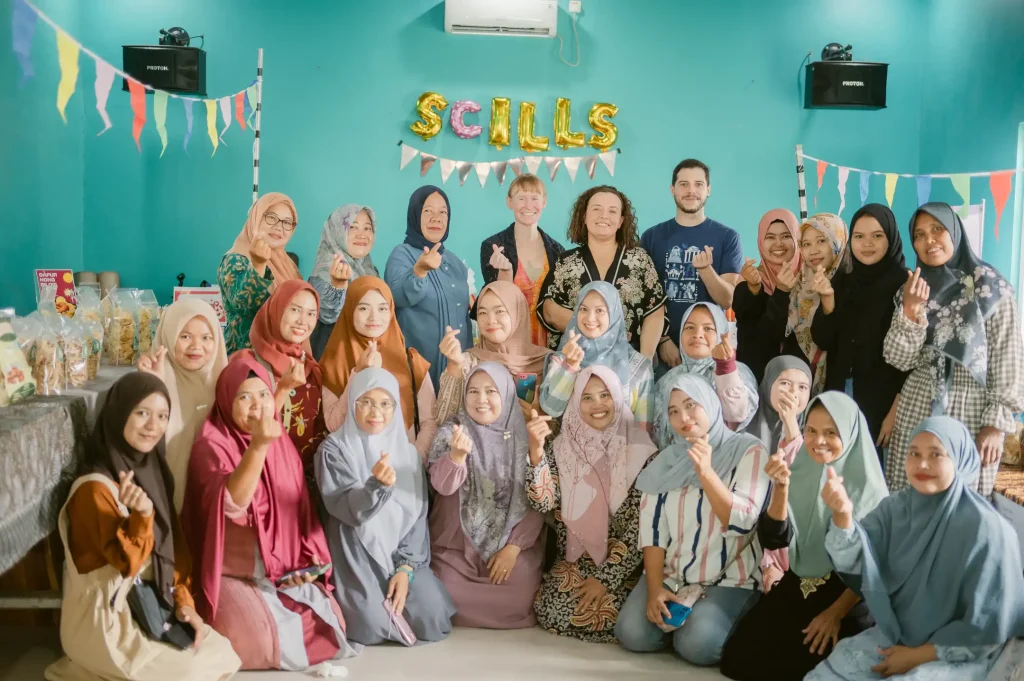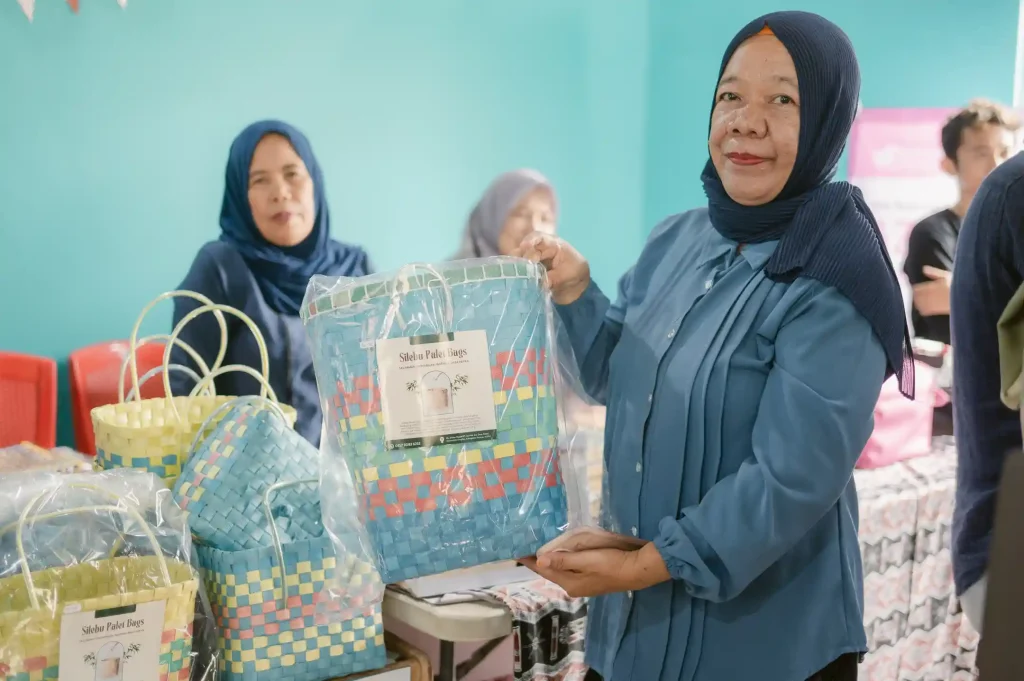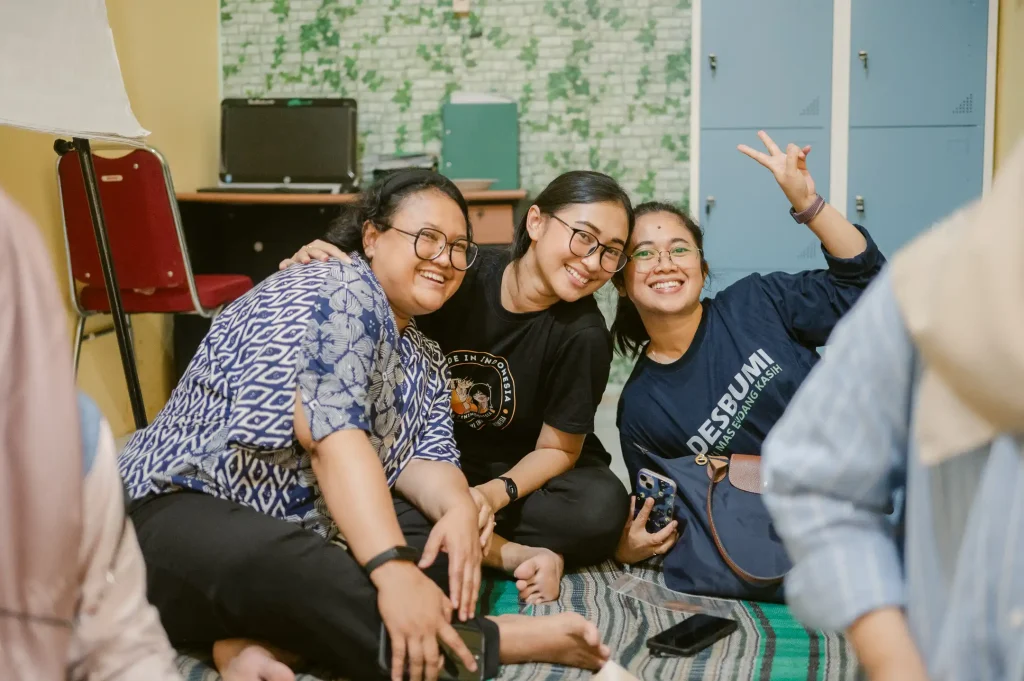By Fatima Zahra Lbouhmadi, Monitoring, Evaluation, and Learning Specialist
In November 2024, the Strengthening Communities/Improving Lives and Livelihoods (SCILLS) program team brought together grantees from Indonesia and Bangladesh for a gathering in Jakarta. The event was an opportunity to share ideas, build connections, and strategize ways to advance digital inclusion. After the gathering, the team visited the beneficiaries of four partner organizations. One of SCILLS’s partner organizations, Combine Resource Institution, had recently launched a project focused on equipping teachers and a rural school with digital skills. The other three organizations—ICT Watch in Indramayu, Kota Kita in Solo and Klaten, and Atma Connect in Serang, Banten—are working to help women entrepreneurs grow their businesses by using digital tools more effectively.
At its heart, the SCILLS program is about much more than teaching digital skills. It’s about creating opportunities for independence and showing how digital inclusion can drive economic and social progress. By focusing on economic inclusion and increasing educational opportunities, SCILLS empowers individuals and communities to use the Internet confidently and skillfully.

Building Bridges with Digital Skills
Part of promoting economic inclusion, SCILLS program focuses on teaching women entrepreneurs practical digital skills, including marketing, internet safety, and creating content for online platforms. These skills are not only enabling participants to grow their businesses but are also helping them build confidence and overcome business and personal challenges. The site visits in Indonesia, offered a firsthand look at how the program is helping women overcome challenges and thrive in the digital economy.
In Indramayu, participants shared how the program helped them transition to online sales. One woman explained, “I didn’t even know how to take photos, but now I can, and I post on WhatsApp and Instagram to sell my products.” Another shared her experience of recovering from a cyberattack: “My WhatsApp was hacked, and the scammer used my account to ask people for money. Thanks to the training, I learned how to secure my Facebook and social media accounts.”
In Serang, women proudly showcased their products and explained how the training significantly improved their skills. The head of the village attended the meeting, underscoring the program’s value to the community and the importance of supporting such initiatives.
In Solo and Klaten, the SCILLS team participated in a Training of Trainers session with 42 women entrepreneurs. These sessions focused on skills like storytelling and photography, which participants said were vital for growing their businesses. Reflecting on her experience, one participant shared, “In addition to taking part in the training, we share our experiences and challenges, which are often similar, and we learn how to solve them together. Digital education is growing in Solo, and it’s thanks to programs like this.”
The impact of these skills extends beyond business success. One participant explained how the program had transformed her personally, saying, “I come from a shy and conservative family, but I succeeded. I still can’t believe it. I am now more confident and independent, and I believe this can continue for the next generation.”
Many participants emphasized how the program had given them a sense of purpose and community. One woman shared, “I feel I am a more useful person in my community. A good person gives benefits to others, and that’s how I feel. I learn and share knowledge with women who need to improve their businesses through digital skills. I contribute to change and am proud to be part of this community. Without them, I feel I am nothing.” Another described the program as “a window to the future; we gain knowledge and new opportunities.”

Women with Disabilities Creating New Opportunities
The SCILLS program has also had a transformative impact on women entrepreneurs with disabilities, many of whom face barriers to employment and inclusion. These women, who run small businesses like selling cookies or Indonesian meatballs, shared how the program had helped them overcome some of these challenges.
One participant explained, “We had training with the government before, but this program is different. It’s practical, and the exercises make it easier to learn.” Another noted how the training had given her the confidence to share her ideas, saying, “I’m no longer shy about sharing my thoughts, and the skills we learned—like video editing and digital payments—are incredibly helpful.”
For many of these women, SCILLS is more than a training program—it’s a lifeline. One entrepreneur shared, “As women with disabilities, it’s really hard to find jobs, especially at our age. This program is helping us earn, support our families, and be independent.”

A Trainer’s Perspective
The master trainer, who led many of the sessions, shared his reflections on the program’s impact. “The women are not only acquiring digital skills but also building their confidence. I recall some participants at the start of their journey struggling with basic tasks like scanning QR codes or navigating business platforms. Today, they are more confident, actively applying what they’ve learned, and improving their business outcomes compared to two or three years ago,” he said.
He also highlighted the importance of collaboration within the group. “We work with two types of participants—one group of more educated women and another with less formal education. While the educated women tend to pick up skills faster, in the end, both groups succeed. They support and learn from each other, creating a collaborative environment where everyone progresses together.”
This outcome is a powerful reflection of SCILLS’ objectives, which focus on fostering inclusion and building sustainable livelihoods through digital tools. The collaboration between women of varying educational backgrounds ensures the benefits of the program reach beyond individual participants. It creates a ripple effect, empowering participants to support and mentor one another, amplifying the program’s impact.
More importantly, this result demonstrates a shift in mindset—women are becoming more self-assured, resourceful, and willing to take on new challenges. This type of transformation is central to SCILLS’ mission to use digital inclusion as a driver of social and economic progress. By fostering confidence and collaboration, the program is creating long-term resilience and building stronger, more connected communities.
Addressing Challenges Through Digital Inclusion
Participants shared the hurdles they face as entrepreneurs, from balancing family and community responsibilities to competing in crowded markets. Access to capital remains a significant obstacle, with limited funding making it difficult for many women to expand their businesses. For women with disabilities, these challenges are even greater. Physical barriers, such as inadequate transportation, and communication challenges, like the lack of standardized sign language, limit their opportunities further.
Digital inclusion offers practical solutions to many of these challenges. The ability to sell products online reduces reliance on physical markets, expands customer reach, and creates flexibility for women balancing multiple roles. Training on internet safety and digital payments equips participants with the tools they need to operate efficiently and securely, empowering them to take control of their economic futures.
Digital tools make a big difference for women with disabilities, helping them overcome physical barriers and build independence. They open doors to remote work, improve communication, and create connections to broader networks. These tools also help break down biases, giving everyone a fair chance to be judged fairly based on their abilities.

Stories That Reflect Progress and Impact
The stories from Indramayu, Serang, Solo, and Klaten show how digital inclusion can transform lives. Women who once struggled with basic technology now confidently run online businesses. Entrepreneurs with disabilities, who previously faced limited opportunities, are finding independence and dignity.
These individual successes reflect the broader mission of the Internet Society Foundation—to harness the power of the internet as a tool for resilience and inclusion. SCILLS is proof that, with the right tools and opportunities, women can overcome systemic barriers and build stronger, more inclusive communities.
Looking ahead, SCILLS will continue to support their partner local organizations in Indonesia as well as Bangladesh, Brazil, Colombia, Ghana, and Senegal, by funding projects that create tangible impacts in the education and economy sectors. The program remains committed to empowering people including women, youth, and indigenous communities, ensuring they have the tools and skills needed to thrive in a digital world.
